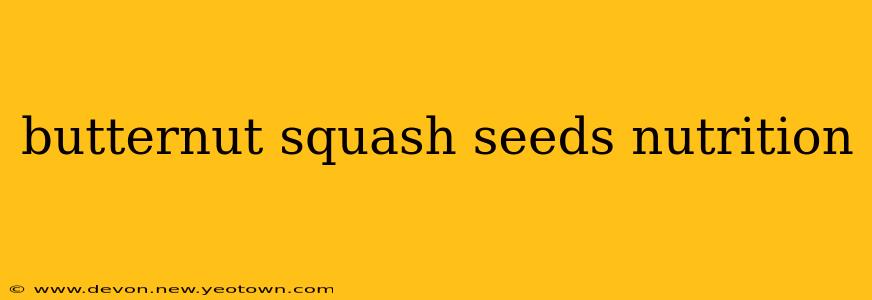Let's be honest, most of us scoop out the delicious butternut squash flesh, roast it to perfection, and then…toss those little seeds in the trash. But hold on a second! Those seemingly insignificant seeds are nutritional powerhouses packed with vitamins, minerals, and healthy fats that deserve a second look (and a place in your diet). This isn't just about adding a healthy snack to your routine; it's about unlocking the hidden potential of a common ingredient and enjoying a delicious, nutrient-rich treat.
What Makes Butternut Squash Seeds So Nutritious?
The story of butternut squash seeds begins with their impressive nutrient profile. These tiny treasures are brimming with essential nutrients that contribute to overall health and well-being. Let's dive into some of the key benefits:
-
High in healthy fats: Butternut squash seeds are a fantastic source of monounsaturated and polyunsaturated fatty acids, including omega-3 and omega-6 fatty acids. These fats are crucial for heart health, brain function, and reducing inflammation.
-
Excellent source of protein: Compared to many other seeds, butternut squash seeds boast a respectable amount of protein. Protein is the building block of our cells and essential for muscle growth, repair, and overall bodily functions.
-
Rich in minerals: These seeds are packed with essential minerals like magnesium, zinc, iron, and manganese. Magnesium supports muscle and nerve function, zinc is vital for immune health, iron is crucial for oxygen transport, and manganese plays a role in bone health and metabolism.
-
Good source of fiber: Butternut squash seeds contribute to your daily fiber intake. Fiber is important for digestive health, helping regulate bowel movements and preventing constipation. It also contributes to feelings of fullness, potentially aiding in weight management.
-
Antioxidant properties: Like many seeds and nuts, butternut squash seeds contain antioxidants that help protect your cells from damage caused by free radicals. This contributes to overall health and may help reduce the risk of chronic diseases.
Are Butternut Squash Seeds Good for Weight Loss?
This is a common question, and the answer is a nuanced "yes, potentially." While butternut squash seeds aren't a magic bullet for weight loss, their high fiber and protein content can contribute to a feeling of fullness, potentially reducing overall calorie intake. However, it's important to remember that portion control is crucial. Like any healthy food, consuming them in moderation is key to reaping the benefits without hindering weight loss efforts.
What are the Best Ways to Eat Butternut Squash Seeds?
Don't let their small size fool you – there are many delicious and easy ways to incorporate these nutritional powerhouses into your diet:
-
Roasted: Roasting enhances their natural nutty flavor. Simply toss them with a little olive oil, salt, and pepper, and roast until golden brown and crispy.
-
Added to salads: Sprinkle roasted butternut squash seeds over your favorite salads for a boost of flavor, crunch, and nutrition.
-
In trail mixes: Combine them with other nuts, seeds, and dried fruits for a healthy and delicious snack.
-
Ground into flour: For the more adventurous, ground butternut squash seeds can be used as a partial substitute for flour in baking.
How Many Butternut Squash Seeds Should I Eat Per Day?
There's no magic number, but moderation is key. A handful (about 1/4 cup) of roasted butternut squash seeds provides a good dose of nutrients without overdoing it on calories. Remember to listen to your body and adjust your intake based on your individual needs and dietary goals.
Are There Any Side Effects of Eating Butternut Squash Seeds?
Generally, butternut squash seeds are safe for consumption. However, some individuals might experience allergic reactions, particularly those with allergies to other nuts or seeds. As always, if you have any concerns or allergies, consult a healthcare professional before significantly increasing your consumption. Additionally, because of their high fiber content, consuming large quantities might lead to digestive discomfort in some people.
By incorporating these delicious and nutritious seeds into your diet, you're not just adding a tasty snack – you're making a smart choice for your health and well-being. So, next time you're preparing a butternut squash dish, remember to save those seeds and unlock their hidden nutritional potential!

